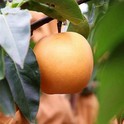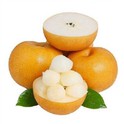Organic pears have gained significant popularity in recent years, and as a dedicated supplier of these delicious fruits, I am often asked about their potential side effects. In this blog post, I'll explore this topic in detail, drawing on scientific research and my own experiences in the organic pear business.
What Are Organic Pears?
Organic pears are grown without the use of synthetic pesticides, fertilizers, genetically modified organisms (GMOs), or irradiation. They are cultivated using natural methods that promote soil health and biodiversity. At our farm, we follow strict organic farming practices to ensure that our pears are of the highest quality and free from harmful chemicals.
Nutritional Benefits of Organic Pears
Before delving into potential side effects, it's important to highlight the numerous health benefits of organic pears. They are a rich source of dietary fiber, which aids in digestion and helps maintain a healthy gut. A medium-sized organic pear contains about 6 grams of fiber, which is about 24% of the recommended daily intake for adults.
Organic pears are also packed with vitamins and minerals. They are a good source of vitamin C, which is essential for a healthy immune system, and vitamin K, which plays a role in blood clotting and bone health. Additionally, they contain potassium, which helps regulate blood pressure and maintain proper heart function.
Potential Side Effects
Allergic Reactions
While rare, some individuals may be allergic to pears. Allergic reactions can range from mild symptoms such as itching, hives, and swelling of the lips, tongue, or throat to more severe reactions like difficulty breathing and anaphylaxis. If you experience any of these symptoms after eating an organic pear, it's important to seek medical attention immediately.
Digestive Issues
Pears are high in fiber, which can be beneficial for most people but may cause digestive issues in some individuals. Eating too many pears at once can lead to bloating, gas, and diarrhea, especially if your body is not used to a high-fiber diet. To avoid these issues, it's recommended to gradually increase your intake of pears and other high-fiber foods.
Pesticide Residue Concerns
One of the main reasons people choose organic pears is to avoid pesticide residues. While organic farming practices significantly reduce the use of pesticides, it's important to note that organic pears may still contain trace amounts of naturally occurring pesticides or residues from neighboring conventional farms. However, these levels are well below the safety limits set by regulatory agencies.


Types of Organic Pears
We offer a variety of organic pears, each with its own unique flavor and texture. Some of our popular varieties include:
- Qiuyue Pear for Laiyang: This variety is known for its sweet and juicy flavor, as well as its crisp texture.
- Round Sugar Pear: As the name suggests, this pear is round in shape and has a high sugar content, making it incredibly sweet.
- Lovely Pear: This pear is small and sweet, with a delicate flavor that is perfect for snacking.
How to Choose and Store Organic Pears
When choosing organic pears, look for fruits that are firm but yield slightly to gentle pressure at the stem end. Avoid pears that are overly soft or have bruises or blemishes.
To store organic pears, keep them at room temperature until they are ripe. Once ripe, you can store them in the refrigerator to extend their shelf life. Ripe pears can be kept in the refrigerator for up to a week.
Conclusion
In conclusion, organic pears are a healthy and delicious fruit that offers numerous nutritional benefits. While there are some potential side effects, such as allergic reactions and digestive issues, these are relatively rare and can be managed with proper precautions. As a trusted supplier of organic pears, we are committed to providing our customers with the highest quality fruits that are grown using sustainable and environmentally friendly methods.
If you're interested in purchasing our organic pears or have any questions about our products, please don't hesitate to contact us. We look forward to the opportunity to work with you and provide you with the freshest and most delicious organic pears available.
References
- "Dietary Guidelines for Americans 2020 - 2025." U.S. Department of Health and Human Services and U.S. Department of Agriculture.
- "Fruit and Vegetable Safety." Centers for Disease Control and Prevention.
- "Organic Farming." United States Department of Agriculture.






